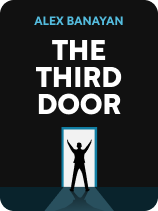

This article is an excerpt from the Shortform book guide to "The Third Door" by Alex Banayan. Shortform has the world's best summaries and analyses of books you should be reading.
Like this article? Sign up for a free trial here.
When does persistence go too far and become harassment? How might you be persistent in an appropriate and measured way?
Alex Banayan wrote his book The Third Door to share what he learned from interviewing several wildly successful people about their paths toward getting ahead in life. In the process of writing it, he found that persistence (even his own) was important—and that it’s possible to take it too far.
Read more to learn how to be persistent without crossing the line, with advice that Banayan learned from inventor Dean Kamen and boxer Sugar Ray Leonard.
How to Be Persistent
To write his book, Banayan had to be persistent in tracking down famous people over several years. One lesson he learned from this process was that, although business books tout endless, relentless persistence, it’s possible to take persistence too far. In several cases, the people he pursued blacklisted him, or nearly did, because his persistence crept over the line into harassment. In his book, he shares what he learned about how to be persistent—that it’s important to know when to pull back and that you should remain professional and recognize when you’re going too far.
(Shortform note: Banayan’s caution about not crossing from persistence to harassment applies not only to business situations but also to personal relationships. In either case, people who refuse to take “no” for an answer are often hoping to change the other person’s mind, and they don’t recognize—or refuse to recognize—when negotiation has turned into manipulation. Experts advise that to avoid crossing that line, you learn to see “no” as an opportunity to reassess: Ask yourself what your offer is missing, or examine why the thing you’re pursuing might not be the right fit for you. These questions can help you improve your offer or point you in a more productive direction, lessons Banayan learned when repeatedly rebuffed.)
Dean Kamen: Try Lots of Solutions, but Strategically
Inventor Dean Kamen gave Banayan insights on how to be strategically persistent so as to be efficient. Kamen invented the Segway and scores of other products, from insulin pumps to water purifiers. He held over 400 patents, was a member of the National Inventors Hall of Fame, and produced a TED Talk that garnered over a million views.
As an inventor, Kamen lived persistence: trying things that failed until discovering something that worked. He came up with a metaphor for persistence: kissing frogs. Based on the princess and the frog fairy tale, it describes a mentality by which you kiss frogs (potential solutions to your problem) until one of them reveals itself as a prince—the right solution.
Though Kamen encourages people to kiss many frogs, he acknowledges no one has the time or resources to kiss every frog available. He offered advice on how to kiss frogs, or pursue ideas, as efficiently as possible.
First, ask yourself if your goal is truly feasible: Does it contradict a law of physics? Is there a fundamental flaw in your product’s idea? Examining your idea for feasibility will prevent you from wasting time pursuing an inherently unworkable solution.
Then, sort your “frogs” into categories, so that instead of blindly kissing every frog possible, you can eliminate swaths of frogs by determining if a type of frog is unworkable. This will save you time.
Finally, if you’re having trouble finding the right frog, rethink the questions you’re asking. If you come at your problem from a new direction, the solution may appear.
Sugar Ray Leonard: Let an Inner Desire Be a Source of Strength
World champion boxer Sugar Ray Leonard also had insight into how to be persistent. Sugar Ray grew up in poverty and saw boxing as a way to better his life. However, he was smaller and less experienced than many of the kids in his neighborhood, so he set out to develop an edge by being more disciplined and more driven than them.
The scrappiness he developed as a child stuck with him into adulthood, and he related how he learned to tap into a “hidden reservoir” of strength to get through difficult fights. This reservoir was a source of inner desire that would propel him forward even when the odds were stacked against him—in other words, it motivated him to stay persistent.
By tapping into this desire, he could move past any doubts he might have. He noted that doubts come from the mind and work against the desires of the heart. But, he could align his heart and mind by focusing on his inner desire and therefore push past adversity.
(Shortform note: Some might call this “hidden reservoir” will, which Ryan Holiday, in The Obstacle Is the Way, defines as an internal power that propels us through adversity and turmoil. Holiday argues that will is more than wanting something badly—will also incorporates flexibility and resilience, qualities that last longer than mere desire. These are the qualities that drove Sugar Ray to meet the challenges he faced as a child and later, as a professional boxer. Holiday’s discussion of will aligns with Sugar Ray’s in that both see will—or, a hidden reservoir—as an inner source of strength coming from the heart that works with the mind to give you the strength to overcome doubts and meet challenges.)

———End of Preview———
Like what you just read? Read the rest of the world's best book summary and analysis of Alex Banayan's "The Third Door" at Shortform.
Here's what you'll find in our full The Third Door summary:
- That there are three doors in life—but most people only know about two
- Insights, tricks, and motivations to help you find your path to success
- Advice from some of the world's most successful people






